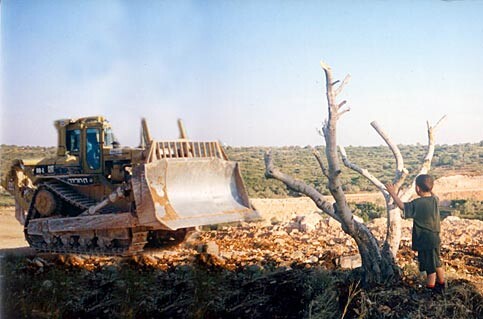The Electronic Intifada Jayyous, Palestine 15 July 2004
The verdict is in at the International Court of Justice: Israel’s “security wall” is illegal. The US will doubtless use its veto in the Security Council to block the will of the Court, as it has done countless times before when measures were introduced to protect the rights of the Palestinian people.
Nevertheless, the Court’s decision will encourage Palestinians in our nonviolent resistance to this Apartheid Wall, and to all other aspects of Israel’s illegal occupation.


Armon Shamasny, aged 11, tries to protect a fruit tree on his family’s land. (Adwan Shamasny)
I am a farmer in Jayyous, a small village near the Palestinian city of Qalqilya and three miles from the 1967 border with Israel. For generations, Jayyous farmers have worked our fields on the outskirts of town each day, and returned to our homes each night.
Now, the Wall cuts through Jayyous.
Before the Wall, Jayyous had six agricultural roads. Now five are blocked. The only way to go to our farms is through the remaining road that leads to the gate in the Wall.
We used to go to our farms whenever we wanted, preferring to work in the early morning and evening when the sun is not so hot. Now we are only “permitted” to go to and from the farms according to the Israeli military. The gate is supposed to be open at 7:30 AM, 12:30 PM and 5:30 PM, but most of the time this schedule is disregarded. We end up waiting for hours for the soldiers to let us through.
Before the Wall, merchants used to come to our farms and purchase our produce. This was very important for our economic survival because Israeli checkpoints were already stopping our trucks traveling from Palestinian farmland to Palestinian cities. Now the merchants cannot come to our farms. The only place we can sell our produce is in small villages, where we get a much lower price.
Before the Wall, we could pay Palestinian workers to help work our land. Now non-land owners cannot pass through the gate, so we cannot get the help we need and many farm workers have lost their jobs. A lot of good land is now left uncultivated and many farmers have had to abandon their land altogether.
Without regular irrigation, thousands of citrus trees have died and there are now less than half the greenhouses that there were before the Wall. Often, farmers who still try to make a living off their land are held up by soldiers for so long at the gate that their harvested fruit rots before they can market it.
Now, many people in Jayyous rely on humanitarian assistance to survive because their land lies inaccessible, just on the other side of the Wall.
Israel finished building the Wall in my village in July, 2003. I did not want to apply for a “permit” to go to my own land, so until last October I camped on my land in a makeshift shed and did not return to my house in Jayyous. Then there was a military crackdown. The Israeli army threatened that not having a permit could result in a heavy fine and a month in detention. So I returned to my village and applied for my permit and only received it five months later.
When I returned I was shocked by the damage neglect had caused my orchards. It was as if I had been gone for five years, not five months. I felt all the trees blaming me as I inspected the mango, the avocado, the walnut, the pear, the apricot, the peach and the fig. I thought about every stage of their lives: from building the retaining walls, stone by stone, plowing the land, to creating the reservoir and beginning the planting. I spoke with every tree and promised I would repair everything.
On my way back to the shed to help my wife prepare our lunch, I saw a tree growing wild inside a large rock. I stared. “How will you live?” I wondered. “Where will your roots spread? Where will you find your food, where store your water?” I understood the lesson: We must continue to live off our land, no matter how terrible the hardships.
I hope you, the American people, will ask yourself whether the billions of dollars in tax money your government provides as aid is really paying for freedom, for justice?
Related Links
Sharif Omar is a Palestinian farmer and community leader. He lives in the
village of Jayyous, near the city of Qalqilya, where he is a member of the
Land Defense Committee. The wall separates his home from his farmland. Omar has been featured in He has been featured on CBSNews.com and The Guardian, and his writing has been published on Alternet.com.


